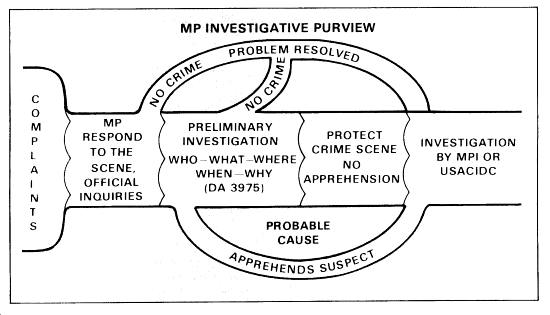INVESTIGATIONS
Military police conduct official inquiries into incidents and crimes involving the military community. Such investigations are a primary means of protecting and enhancing the commander's order and discipline.
All MP conduct preliminary investigations. MP routinely make inquiries to learn the facts about incidents to which they have been called. Based on their inquiry, MP help determine the outcome of an incident by resolving the problem, referring the problem to helping agencies, or determining the need for a full-scale investigation by a trained investigator.
Military investigators conduct systematic and impartial investigations to uncover the truth. They seek to determine if a crime has been committed and to discover evidence of who has committed it. They administer oaths pursuant to Article 136(b)(4), UCMJ (see AR 600-40 and MCM). They find, protect, collect, and preserve evidence discovered at the crime scene or elsewhere. They document their findings and their actions with careful records. They ensure evidence is accounted for by a complete chain of custody to allow it to be admissible in court. They conduct interviews and interrogations in a manner that ensures depositions, statements, admissions, and confessions can be accepted in court. And as professional fact finders they maintain unquestionable integrity in the course of conducting their investigations. They treat victims of and witnesses to a crime with dignity, courtesy, and consideration, and assist them in obtaining medical or social services if needed or requested. Their charter is to impartially find, examine, and make available evidence that will clear the innocent and allow prosecution of the guilty.
Full-scale investigations are conducted by MPIs and enlisted special agents (MOS 95D) or warrant officers assigned to USACIDC. Responsibility for the investigation depends on the nature of the incident and the elements of the crime. The MPIs work directly for the PM. Special agents support the local PM but are under the direct control of USACIDC. Close and positive liaison is maintained between the PM office and the USACIDC support element.
With the approval of the commander concerned, MPIs may provide assistance to USACIDC whenever USACIDC assumes responsibility for an investigation from MPIs. Additionally, when requested by a USACIDC unit commander or special agent in charge, a supported commander may provide MPI assistance to USACIDC on a case-by-case basis for a limited time. Likewise, MPIs may request and obtain USACIDC assistance on a case-by-case basis.
Joint MPI/USACIDC teams have been created at some installations for specialized investigative missions such as drug suppression, black market, and criminal information. Joint teams have increased the effectiveness of total community law enforcement efforts in areas that share overlapping investigative or enforcement responsibilities. Such joint teams are created by formal memorandums of understanding between the local PM and the responsible USACIDC supervisor.
In a peacetime environment, criminal investigations conducted by military investigators receive intense effort and support. During combat such investigations may not receive the same effort and support. HN authorities, if available, will also provide investigative support to the battlefield.
The PM directs when, what type, and under what circumstances to begin criminal investigations that fall within their purview. Although effort is made to adequately and thoroughly investigate such crimes, investigations are not allowed to interfere with accomplishment of a combat mission. USACIDC will maintain a dedicated investigative force on the battlefield to investigate serious crime affecting the battlefield capabilities of the supported commander. When combat operations take priority, MPIs and MP will only be able to gather the essential who, what, when, where, why, and how of the crime. The information will be passed to the PM operations section, where it will be reviewed and forwarded to the G1 and the appropriate unit commander. The operations section will also make appropriate referrals to USACIDC of reported crimes within their command. See FM 19-20 for more information on criminal investigations.
Two types of criminal investigations are performed by MP on the battlefield. Minor crimes are investigated by personnel from MP company operations sections. In a combat environment, few MP investigations of minor incidents will be required. Major incidents involve death, serious bodily injury, war crimes, and major property loss or damage. MP may verify such major incidents if operational priorities permit. These incidents will be referred, whether verified or not, to criminal investigators assigned to USACIDC.
The number of MP used for criminal investigation operations is directly related to the level and intensity of the battle. MPIs are assigned to MP companies in division and above to conduct criminal investigations. These MPIs are shown in their company's TOE by the skill identifier V5. Although each company has trained investigators, in combat these investigators may not be available at all times. They may be on missions having higher priority. Therefore, every MP team must be able to gather basic information about battlefield crimes.
USACIDC investigators on the battlefield are usually collocated with MP unit HQ for ease of coordination and support. But command and control of these investigators usually stays within the USACIDC chain of command. Organization and employment of USACIDC investigators during combat operations is discussed in FM 19-1.
|
NEWSLETTER
|
| Join the GlobalSecurity.org mailing list |
|
|
|


